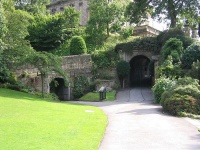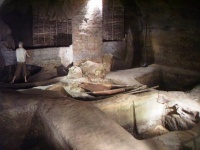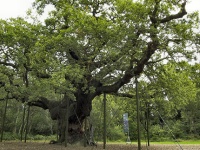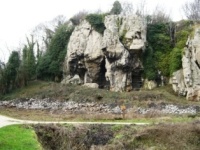City guides


Nottingham Travel Guide
Situated on the River Trent in England's East Midlands, the historic county town of Nottingham is famously known as the home of legendary outlaw Robin Hood, who famously robbed from the rich to give to the poor.
Today's historians have cast doubt on whether Robin actually existed; and if he did, whether he did indeed live in Sherwood Forest near the city and do battle with the wicked Sheriff of Nottingham, as the much-vaunted legend has it.
What is not in doubt is that Robin has done much to promote tourism in this ancient city, which boasts another, very real and unique attraction in the form of a system of sandstone caves beneath the city, used as dwellings by Anglo-Saxons and later as the medieval hang-out of thieves and vagabonds, and even later as bomb shelters during World War II.
From an Anglo-Saxon settlement founded in around 600 AD, Nottingham developed into an important commercial capital for the region during the Middle Ages and then went on to become one of England's major manufacturing cities, producing top-quality Victorian lace and hosiery.
Today, Nottingham is saved from being just another heterogeneous English county capital by its legends and unique attractions, making it a city well worth including on the itinerary of any tour of the British Isles.
Things to do in Nottingham
Although the Robin Hood legends give the city a certain romantic allure, the network of manmade sandstone caves called the City of Caves is Nottingham's greatest tourist attraction. Just outside of the city, the Cresswell Crags offer natural cave systems of great archaeological significance due to the evidence of Ice Age inhabitants.
Above ground Nottingham is a pleasant and busy English town, equipped with an impressively large Market Square and thriving shopping streets around the site of its central Castle Rock, which is now topped with a Ducal Mansion (the original castle having been destroyed).
The city was once a lace-producing centre and the Lace Market Centre provides some insight into the history of this delicate art form. Nottingham is also renowned for its watering holes, and three of the local pubs claim to be England's oldest: The Bell, Old Salutation, and Ye Olde Trip to Jerusalem.
Those on the trail of Robin can seek him out in Sherwood Forest where the huge and ancient oak trees are accessible via a pleasant network of walking trails. There is also a Robin Hood Festival held annually in summer in Nottingham that will delight fans of the legends.

Ducal Mansion (Nottingham Castle)
Towering over the city centre of Nottingham is a magnificent 17th-century mansion, built on a sandstone outcrop (Castle Rock) on the site of the original medieval castle erected by William the Conqueror in 1067. The castle building now houses the city's finest art collection, and a small museum charting the history of the Sherwood Foresters Regiment. The art galleries include interactive displays and the artworks are presented in a vibrant, interesting way. The well-kept grounds of the castle are used for a full calendar of events, from historic pageants to an outdoor theatre season. There are also fascinating cave tours, a medieval-style children's playground and a picnic area, as well as a rather famous statue of Robin Hood himself.

City of Caves
A system of man-made caves carved into the sandstone beneath the city of Nottingham has been developed into a modern, award-winning attraction known as The City of Caves. Anglo-Saxons originally inhabited the caves, and their lifestyle is depicted in dramatic presentations for visitors who come to explore Nottingham's 'underworld'. Over the centuries, the caves have been put to various uses by the locals, and were saved by protestors when developers planned to build a modern shopping centre over the top of them. Now guided tours take visitors through the caves and through the ages, from the mystical 'Enchanted Well', through a working medieval tannery, to the Victorian slum of Drury Hill and a World War II bomb shelter. Visitors should note that The City of Caves is not wheelchair accessible.

Sherwood Forest
Accessed by the A614 highway, Sherwood Forest makes a great getaway close to Nottingham city. Rather reduced from the green splendour it evinced in the days of Robin Hood, Sherwood Forest is nevertheless as ecologically important and interesting as it is historically. Around 500,000 visitors a year come to enjoy Sherwood Forest Country Park, wandering the family nature trails, and admiring the huge ancient oaks and teeming insect and bird life. A big attraction is the mighty Major Oak, still flourishing in the forest after 800 years. Sherwood Forest is also the site of the popular Robin Hood Festival, held annually in summer.

Cresswell Crags
A short distance from the M1 motorway near Nottingham is an ancient limestone gorge, honeycombed with caves, where archaeologists have found traces of Ice Age inhabitants who lived here up to 50,000 years ago. The Cresswell Crags are a rare site, featuring Britain's only known Ice Age-era rock art. At the east end of the gorge visitors can find out its archaeological significance at a museum and education centre, equipped with several high-tech interpretive exhibitions. The area itself can also be explored, rewarding visitors with its sweeping views and interesting rock formations; while actual tours of the caves are run on weekends and during school holidays only. Check the website for details.
United Kingdom travel info
Electricity
The electrical current in the UK is 240 volts, 50Hz. Flat, three-pin plugs are standard.
Language
English is the official language, though visitors will be astonished by the variety of regional accents.
Money
The currency is the British pound (GBP), which is divided into 100 pence. ATMs are available in almost all towns and Visa, MasterCard and American Express are widely accepted. Foreign currency can be exchanged at bureaux de change and large hotels, though better exchange rates are likely to be found at banks.
Tipping
Tips of 10 to 15 percent are expected in restaurants and upmarket hotels in the UK if a service charge hasn't been included. Hotel service staff receive an optional amount, while taxi drivers are usually given 10 to 15 percent of the fare. Tipping bartenders isn't expected, and tipping for other services is discretionary.
Health
There are no specific health risks associated with travel to the UK and food and water can be considered safe. The British National Health Service is excellent, and a number of countries have reciprocal health agreements with the UK including Australia, New Zealand and EU countries. Visitors from other countries such as Canada, South Africa and the United States are advised to take out comprehensive travel insurance.
Safety
It's generally safe to travel throughout the UK.
Local customs
Handshaking is customary when introduced to someone new. Smoking is banned in all enclosed public spaces, including pubs, restaurants and public transport. Queue barging is frowned upon and there is strict etiquette on escalators: stand on the right, walk on the left. Visitors may find Londoners more rushed and less friendly than locals in other parts of the country, particularly on London transport, where tourists are often the only people who talk.
Doing business
The four countries of the United Kingdom, although culturally and historically different, generally keep to the same business practices. Politeness and punctuality are key to good business relations and initial meetings are often conducted formally and impersonally, becoming more open and social as things progress. Business cards are exchanged at introductions, and dress is formal with dark suits preferred. Business hours are generally 8am to 5pm Monday to Friday with an hour taken at lunch.
The communication style can be difficult to adjust to: the British people respect politeness to a point that often obscures their ability to say exactly what they mean. As a result, travelling business people may need to learn to 'read between the lines' and to take cues from tone of voice and facial expression. Humour is also an integral part of the British system of communication, and is used to diffuse a tense situation and to cultivate relationships. Foreigners should never assume that an attempt at humour undermines a person's ability to do their job, or discredits the importance they attach to a deal or negotiation. Furthermore, they shouldn't be fooled into thinking that the British propensity for irony and sarcasm equates with an informal work environment.
Foreigners should be tactful during meetings, avoid becoming emotional and illustrate their experience with the subject at hand. Performance and initiative are looked upon favourably, whereas academic pretension is given far less credence. Meetings are often used as platforms for debate, rather than moments of confirmation, so there should be no surprise if not much progress is made. Foreigners should be sure to respect and appeal to all parties involved, as the British have recently begun to take a far flatter approach to management and the responsibility of decision-making. And if things go well, it's worth purchasing a pint or two for clients or colleagues; though gifts are borderline inappropriate, a round of drinks will rarely be refused.
Duty free
Travellers can bring the following goods into the UK tax or duty free: 200 cigarettes, 100 cigarillos, 50 cigars or 250g of tobacco, 18 litres of still table wine, 42 litres of beer, 4 litres of spirits or strong liqueurs or 9 litres of fortified wine, sparkling wine or other alcoholic beverages of less than 22 per cent volume.
Communications
The international country dialling code for the UK is +44. Mobile phone coverage is extensive and free WiFi is widely available in pubs and coffee shops. Travellers can purchase local prepaid SIM cards for unlocked phones or use eSIMs if their cellular providers support it on their networks.
Passport & Visa
If a visa is not required, travellers should hold a return or onward ticket, and proof of funds for the duration of stay. Passports must be valid for the period of intended stay in the UK. It's highly recommended that travellers' passports have at least six months' validity remaining after the intended date of departure from their travel destination. Immigration officials often apply different rules to those stated by travel agents and official sources. For visitors who are visa exempt up to a maximum stay of six months, the period of stay will be determined by the Immigration Officer on arrival.
Entry requirements
US travellers must hold a passport that is valid for the duration of their stay; a visa is not required for stays of up to six months.
Canadian passports must be valid for at least the expected duration of the stay. No visa is required for stays of six months or less.
Australian passports must be valid for at least six months after the departure date. No visa is required for stays of six months or less.
South Africans require a valid passport and a visa for entry or transit through the UK. South African temporary passports are not recognised.
Under the Common Travel Area agreement, citizens from the UK and Ireland are not required to pass through passport control. They can travel between both countries without a valid passport if they can prove they are a valid UK or Irish national.
New Zealand nationals must hold a valid passport, but no visa is required for stays of up to six months.
Useful contacts
United Kingdom Tourism Website: www.visitbritain.com
999 (General)Embassies / consulates in other countries
British Embassy, Washington DC, United States: +1 202 588 6500.
British High Commission, Ottawa, Canada: +1 613 237 1530.
British High Commission, Canberra, Australia: +61 2 6270 6666.
British High Commission, Pretoria, South Africa: +27 12 421 7500.
British Embassy, Dublin, Ireland: +353 1 205 3700.
British High Commission, Wellington, New Zealand: +64 4 924 2888.
Embassies / consulates in United Kingdom
United States Embassy, London: +44 20 7499 9000.
Canadian High Commission, London: +44 20 7004 6000.
Australian High Commission, London: +44 20 7379 4334.
South African High Commission, London: +44 20 7451 7299.
Irish Embassy, London: +44 20 7235 2171.
New Zealand High Commission, London: +44 20 7930 8422.


